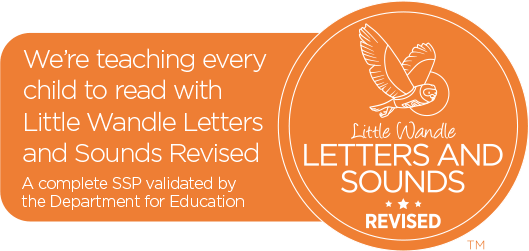English
Reading

At St. Matthew's we believe it is crucial for all children, not only to learn to read but to become fluent, enthusiastic readers. We teach early reading through 'Little Wandle Letters and Sounds Revised', which is a systematic and synthetic phonics programme. We start teaching phonics at the beginning of Reception and follow the progression that Little Wandle provide through to the end of Year 1. This ensures that children build on their growing knowledge of the alphabetic code, mastering phonics to read and spell as they move through school.
At St. Matthew's we also model the application of the alphabetic code through phonics in shared reading, both inside and outside the phonics lesson and across the curriculum. We have a strong focus on language development for our children because we know that speaking and listening are crucial skills for reading and writing in all subjects.
We teach children to read through reading practise sessions three times a week in Year R and Year 1. These sessions are taught in small groups and use books matched to the children’s secure phonic knowledge using the Little Wandle Letters and Sounds Revised assessments. The reading practise sessions have been designed to focus on three key reading skills:
- decoding
- prosody: teaching children to read with understanding and expression
- comprehension: teaching children to understand the text.
Use the links below to see the curriculum overview for the teaching of phonics in Key Stage One.
As children move to KS2, we move to a 'whole class' model of teaching where all children access the same 'real' texts and are taught a progression of reading skills linked to the domains of:
- word reading (decoding, prosody and knowledge of prefixes, suffixes and root words)
- clarify (to be able to work out the meaning of unfamiliar words, phrases and text)
- summarise (understand and explain the key events/ideas from the text)
- select and retrieve (pick out information from the text to answer questions)
- respond and explain (share your own opinions and ideas about the text)
- inference (reaching conclusions based on the evidence given)
- language for effect (to know how the language used create a particular mood or effect)
To see which books we use within our guided reading lessons, look at the Long Term Planning which is underneath 'Writing'.
Writing
We are continually developing our Long Term Plan within English to ensure that English Learning journeys are planned and embedded into our themes and allow children to again be exposed to high quality texts. These are regularly evaluated by teachers and readjusted where needed.
Within our learning journey, vocabulary development is a huge focus in which we are planning for. This will teach children how to make selective word choices within their writing as well as use and manipulate vocabulary to create a desired effect on the reader. The audience, purpose and outcome are made clear to the children at the start of the learning journey so they know what they are working towards.
We have developed a phased planning approach which incorporates; Stimulate and Generate, Capture, Sift and Sort, and Create, Edit and Improve. Within the Stimulate and Generate Phase, children will explore the text or parts of the text including the features of the text type, be introduced and explore key vocabulary, be given opportunities to try out the vocabulary. Within the Capture, Sift and Sort Phase, the children are taught and given opportunities to explore selected spelling, punctuation or grammar skills that link to the text type that they are exploring. Finally, within the Create, Edit and Improve Phase, the children are given the opportunity to not only create their own piece of writing but also have time to edit, improve and redraft their writing. See the links below for each year group's long term plan for English.
Year 1 Cycle B LTP 2023-2024 Year 1 Cycle A 2024-2025
Year 2 Cycle B LTP 2023-2024 Year 2 Cycle A LTP 2024-2025
Year 3 Cycle B LTP 2023-2024 Year 3 Cycle A LTP 2024-2025
Year 4 Cycle B LTP 2023-2024 Year 4 Cycle A LTP 2024-2025
Year 5 Cycle B LTP 2023-2024 Year 5 Cycle A LTP 2024-2025
Year 6 Cycle B LTP 2023-2024 Year 6 Cycle A LTP 2024-2025
